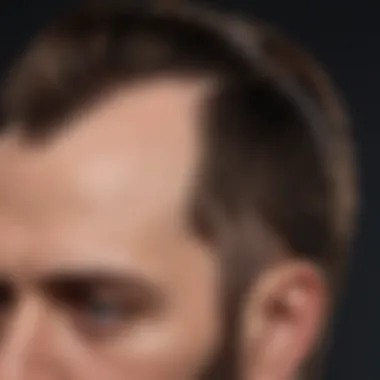Unveiling the Root Causes of Thinning Hair: Understanding the Complex Factors Behind Hair Loss


Trendy Haircut Trands
- Explroe the latest haircut styles for men and how to acihve them.
- Expert advice on how to maintain your trendy haircut.
- Collection of trendy haircut inspiration from celebrities and influencers.
Understanding Thin Hair
When delving into the intricate details of thinning hair, it becomes imperative to understand the underlying factors that contribute to this common concern. Thin hair can result from various influences, ranging from genetic predisposition to hormonal imbalances, nutritional deficiencies, stress, and medical conditions. By shining a light on each aspect, readers can uncover the intricate web of reasons behind thin hair, paving the way for effective strategies to address and manage this issue.
Genetic Predisposition
Genetic predisposition plays a pivotal role in the realm of thin hair. Family history influence stands out as a significant factor in understanding why some individuals are more prone to experiencing hair thinning. Exploring the ties between familial genetics and hair health can provide valuable insights into one's predisposition to thin hair concerns. Inheritance patterns further contribute to unraveling the mystery behind thin hair. By examining the ways in which traits are passed down through generations, we can discern how genetic factors shape our hair density and quality. Understanding these genetic nuances is crucial in devising personalized hair care approaches to combat thinning effectively.
Hormonal Imbalance
Hormonal imbalance emerges as another key player in the narrative of thinning hair. The impact of hormonal fluctuations on hair growth can be profound, influencing the thickness and vitality of one's locks. Diving deeper, androgenetic alopecia surfaces as a specific condition associated with hormonal imbalances, underscoring the intricate relationship between hormones and hair health. Acknowledging these hormonal intricacies sheds light on why certain individuals may experience thinning hair due to underlying imbalances. By grasping the nuances of hormonal influences on hair, one can tailor targeted interventions to restore hair density and promote growth.
Nutritional Deficiencies
Nutritional deficiencies serve as a silent yet influential factor in the realm of thin hair. Essential nutrients for hair health function as the building blocks for strong and vibrant tresses. Understanding the pivotal role that nutrients like vitamins play in supporting hair growth is essential for addressing thinning concerns. Meanwhile, the effects of vitamin deficiency underscore the repercussions of inadequate nutrition on hair quality. By honing in on the link between nutrition and hair health, individuals can make informed dietary choices to nurture their strands and combat thinning effectively.
Stress and Anxiety
Stress and anxiety introduce a psychological component to the narrative of thinning hair. Psychological factors can have a profound impact on hair health, influencing factors like hair loss and thinning. Telogen effluvium, a condition associated with stress-related hair shedding, highlights the intricate interplay between mental well-being and hair condition. By acknowledging the psychosomatic aspects of hair thinning, individuals can adopt holistic approaches to manage stress and anxiety, mitigating their impact on hair health.
Medical Conditions
Medical conditions form another layer of complexity in the landscape of thin hair. Thyroid disorders can disrupt the delicate balance of hormones crucial for healthy hair growth, resulting in thinning and loss. Similarly, scalp infections can wreak havoc on the scalp environment, compromising the conditions necessary for robust hair. Understanding these medical aspects is crucial in identifying and addressing underlying health issues that may manifest as thinning hair. By addressing medical conditions effectively, individuals can restore balance to their scalp and promote optimal hair growth.


External Influences on Hair Density
In the intricate landscape of factors contributing to thinning hair, External Influences on Hair Density emerges as a pivotal theme to be dissected and understood in this insightful article. By delving into the realm of how external factors impact hair density, we unravel a sophisticated tapestry of nuances that shed light on the intricate mechanisms at play. Understanding the nuances of external influences equips individuals with the knowledge needed to make informed choices regarding their hair care routines. From the perils of overstyling to the environmental assailants that challenge hair health, each aspect holds significance in the quest for luscious locks.
Hair Care Practices
Overstyling Effects
Embarking on a discourse about Overstyling Effects, we unearth a critical facet in the framework of hair care practices under the spotlight. Delving into the repercussions of excessive styling on hair health, we confront a grave reality faced by many individuals seeking aesthetic perfection. The allure of styling intricacies may seem enticing, yet the toll it takes on hair density cannot be overlooked. This section eloquently delineates the adverse effects of overstyling and elucidates why moderation is key in the pursuit of healthy and voluminous tresses. Scrutinizing the detrimental impacts paves the way for a more informed approach towards styling choices, aiding in the preservation of hair density.
Chemical Damage
Navigating the realm of Chemical Damage, we encounter a significant player influencing the overarching theme of hair health. Unveiling the deleterious effects of chemicals on hair strands, we unravel a compelling narrative that underscores the importance of cautious treatment selection. The distinct characteristic of chemical damage lies in its subtle yet pervasive nature, silently eroding hair density with each application. Delineating the unique features and repercussions of chemical damage offers readers a nuanced perspective on the choices influencing their hair's well-being. This exploration serves as a beacon of awareness, guiding individuals towards conscious decisions that safeguard their hair from irreversible harm.
Environmental Factors
Pollution Impact
Exploring the realm of Pollution Impact, we confront a sobering reality that permeates the discourse on hair density and environmental influences. Discussing the detrimental effects of pollutants on hair vitality unveils a stark truth that demands recognition. The insidious nature of pollution's impact on hair quality manifests in subtle yet profound ways, necessitating heightened vigilance in combating this ubiquitous threat. Shedding light on the characteristics and consequences of pollution impact reveals the imperative of protective measures to shield hair from this pervasive hazard.
UV Radiation
Delving into the domain of UV Radiation, we unravel a significant environmental factor shaping the narrative of hair health and resilience. Understanding the profound implications of ultraviolet rays on hair structure offers a crucial vantage point in navigating the complexities of protective care. Highlighting the key characteristics and considerations surrounding UV radiation underscores its prominent role in the discourse on external influences. By delineating the unique features and impacts of UV radiation on hair density, readers gain a comprehensive perspective on fortifying their tresses against environmental aggressors.
Exploring Lifestyle Habits
In this article, the section on Exploring Lifestyle Habits delves into the fundamental role that lifestyle choices play in influencing hair health. It meticulously examines how habits such as smoking, alcohol consumption, physical activity levels, and stress management can significantly impact the thickness and overall condition of one's hair. Understanding the importance of lifestyle habits is paramount in unraveling the root causes of thin hair, as these factors can either nurture or hinder hair growth and density.


Smoking and Alcohol Consumption
Smoking and alcohol consumption are integral aspects of lifestyle habits that can exert profound effects on hair health. The toxic effects of smoking not only detrimentally impact overall well-being but also specifically target the hair follicles, leading to diminished hair quality and increased hair loss. The deleterious consequences of smoking on hair health stem from its ability to disrupt the circulation of blood and essential nutrients to the hair follicles, impeding their optimal function and regrowth. Additionally, alcohol consumption, when indulged in excessively, can further exacerbate hair thinning by contributing to hormonal imbalances and nutritional deficiencies. Understanding the toxic effects of smoking and alcohol consumption is crucial in grasping the holistic approach required to combat thinning hair effectively.
Toxic Effects
The toxic effects of smoking manifest in the form of decreased blood circulation to the scalp, depriving the hair follicles of vital oxygen and nutrients essential for healthy growth. This disruption in blood flow alters the hair's growth cycle, leading to weakened follicles and increased susceptibility to breakage and shedding. Moreover, the toxins present in cigarettes can directly damage the DNA within the hair follicles, accelerating hair loss and thinning. Addressing these toxic effects necessitates a concerted effort to quit smoking and mitigate the adverse consequences it poses to hair health.
Blood Circulation Impact
Conversely, blood circulation impact refers to the crucial role that adequate circulation plays in promoting optimal hair growth and thickness. Improved blood circulation ensures that the hair follicles receive an ample supply of nutrients and oxygen, facilitating their nourishment and rejuvenation. By enhancing blood flow to the scalp through regular massage or targeted exercises, individuals can revitalize their hair follicles and promote a healthier, more voluminous mane. Understanding the significance of blood circulation impact underscores the importance of adopting lifestyle changes that prioritize vascular health and overall well-being.
Physical Activity Levels
Physical activity levels hold immense sway over hair health, making them a pivotal focus in addressing thinning hair concerns. Regular exercise not only enhances cardiovascular fitness and muscular strength but also plays a critical role in promoting hair growth and thickness. By engaging in physical activities such as aerobics, strength training, or yoga, individuals can stimulate blood flow to the scalp, nourishing the hair follicles and fostering an environment conducive to robust hair growth.
Exercise Benefits
The benefits of exercise extend beyond physical fitness, encompassing positive outcomes for hair health as well. Regular exercise boosts endorphin levels, which in turn helps alleviate stress and promote a sense of well-being. Additionally, physical activity enhances blood circulation throughout the body, including the scalp, ensuring that the hair follicles receive the necessary nutrients for optimal growth. Embracing exercise as a lifestyle habit not only fortifies overall health but also nurtures the vitality and thickness of one's hair, exemplifying the synergistic relationship between physical well-being and hair health.
Stress Reduction
Stress reduction emerges as a key component of maintaining healthy hair, underscoring the intricate link between psychological well-being and hair quality. Chronic stress can precipitate hair loss by inducing hormonal imbalances and disrupting the hair's growth cycle, leading to thinning and shedding. Implementing stress-reduction techniques such as meditation, mindfulness practices, or hobbies can help mitigate the adverse effects of stress on hair health, promoting a conducive environment for robust hair growth.
Effective Strategies for Combatting Thin Hair
Thin hair poses a common concern for many individuals, necessitating the exploration of effective strategies to combat this issue. Within the realm of hair care, addressing thinning hair is crucial, requiring a multifaceted approach to restore volume and thickness. This article delves deep into various methodologies and practices aimed at rejuvenating hair health and density, providing readers with a comprehensive guide on combating thin hair effectively.


Dietary Adjustments
When considering combatting thin hair, dietary adjustments play a pivotal role in promoting optimal hair growth and vitality. Incorporating hair-healthy foods into one's diet can significantly enhance the overall health of the hair follicles, leading to improved thickness and texture. From essential vitamins and minerals to proteins and antioxidants, a balanced diet rich in nutrients is key to nourishing the scalp and supporting robust hair growth.
Incorporating Hair-Healthy Foods
Incorporating hair-healthy foods such as leafy greens, nuts, fish, and fruits can supply the body with essential nutrients like vitamins A, C, D, and E, as well as omega-3 fatty acids and biotin. These elements are known to fortify hair strands, promote elasticity, and stimulate growth, making them indispensable in any regimen targeting thinning hair. Prioritizing these nutrient-rich foods can significantly impact the overall health and resilience of the hair, offering a natural and holistic approach to combating thinning.
Supplements Recommendation
In addition to a nutrient-dense diet, supplements play a complementary role in addressing nutritional deficiencies that may contribute to hair thinning. Targeted supplements containing biotin, keratin, collagen, and other hair-strengthening ingredients can offer added support for those seeking to improve hair density and quality. However, it is essential to consult a healthcare professional before incorporating supplements into one's routine to ensure safety and efficacy, as excessive intake can have adverse effects on overall health.
Scalp Care Regimen
A diligent scalp care regimen is imperative for individuals looking to combat thin hair effectively. Proper cleansing techniques and scalp massage practices can invigorate the hair follicles, promote circulation, and create an optimal environment for healthy hair growth. By nurturing the scalp, one can mitigate common issues like dryness, buildup, and inflammation, fostering an environment conducive to robust hair development.
Gentle Cleansing Techniques
Gentle cleansing techniques involve using mild, sulfate-free shampoos and conditioners to cleanse the scalp without stripping it of its natural oils. Massaging the scalp gently while washing can improve blood flow to the hair follicles, delivering essential nutrients and oxygen for enhanced growth and vitality. Regular scalp exfoliation and moisturization further contribute to maintaining a healthy scalp environment, laying the foundation for voluminous and resilient hair.
Scalp Massage Benefits
Scalp massage offers a range of benefits for individuals with thin hair, including stress relief, improved circulation, and stimulation of hair follicles. By incorporating a regular scalp massage into one's routine, individuals can enhance nutrient delivery to the scalp, reduce tension that may impede hair growth, and promote relaxation. Additionally, scalp massage has been associated with increased hair thickness and strength, making it a valuable component of any comprehensive hair care regimen.
Medical Interventions
In cases where dietary adjustments and scalp care are insufficient to address thinning hair, seeking medical interventions may be necessary to explore advanced treatment options. Consulting a dermatologist and exploring specialized treatments tailored to individual needs can provide targeted solutions for hair restoration and revitalization, offering a deeper level of intervention beyond traditional care methods.
Consulting a Dermatologist
Consulting a dermatologist specializing in hair disorders allows individuals to receive personalized recommendations and diagnostic evaluations to pinpoint the root causes of thinning hair. Dermatologists can offer insights into underlying conditions, hormonal imbalances, or genetic predispositions affecting hair health, guiding patients towards tailored treatment plans for optimal results. With expert guidance and professional expertise, individuals can navigate the complexities of thinning hair with confidence and precision.
Treatment Options
Various treatment options exist for combating thin hair, ranging from topical solutions and oral medications to advanced procedures like laser therapy and hair transplants. Each treatment modality targets specific aspects of hair restoration, be it stimulating follicle growth, inhibiting hair loss, or enhancing scalp health. Understanding the advantages and limitations of each treatment option is crucial in making informed decisions regarding the most suitable interventions for addressing thinning hair effectively.















